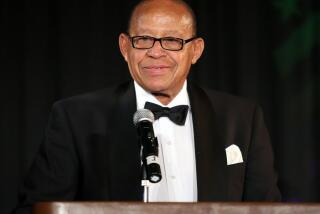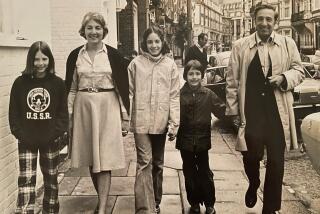Gladwin Hill; War, Environment Reporter
- Share via
Gladwin Hill, an inveterate World War II combat correspondent who spent much of his later years as the New York Times’ first Los Angeles bureau chief and then as a pioneer in environmental reporting, is dead.
His wife, Carole, said Monday that Hill, a heavy smoker, was 78 when he died of lung cancer Saturday at his Los Angeles home.
Tall, patrician and natty with his omnipresent bow tie, Hill was one of the first journalists in the now-crowded environmental field, watching as Los Angeles and other cities moved from seemingly endless boom economies to metropolises with limits.
Even when he retired in 1979 after 10 years as the New York Times’ first environmental writer, Hill remained a force in Los Angeles, teaching at USC, contributing articles to local magazines and newspapers and schmoozing with the movers and shakers of Hollywood and the media. One of his books, “Dancing Bear: An Inside Look at California Politics,” remains a definitive treatment of the state’s political landscape and is widely used in college classes.
“He came from the old school that had a certain gentlemanliness,” said Jack Languth, a former Hill colleague who is now a professor of journalism at USC.
Hill was born in Boston, the son of a New York Times reporter. After graduating from Harvard College in 1936, he was hired by the Associated Press and roamed the country as a columnist and feature writer.
In 1942, he was sent by the AP to London as a war correspondent and covered the Allied air campaign against Germany for two years alongside his arch-competitor, Walter Cronkite, who then worked for United Press.
Hill became the first reporter to fly on an American bomber on a raid into Germany, and he also witnessed the Allied invasion of France in 1944 from a bomber. A few months later, he reopened the AP bureau in Paris.
Hill joined the New York Times in 1945 and covered the Allied march eastward. He became one of the first reporters to enter Berlin and then to cross into Poland.
In 1946, Hill established the first Times bureau in Los Angeles. He served as bureau chief for 23 years, covering such events as atomic weapons testing and the assassination of Robert F. Kennedy in 1968.
“He understood the importance of California long before the competition did,” said author David Halberstam, a former New York Times reporter and Pulitzer Prize winner. “He understood that California was going to be California, a post-World War II Mecca, when all the rest of us thought it was a sleepy place.”
Hill’s first wife, Elisita Stuntz, died in 1977. In addition to Carole, his wife of five years, he is survived by a daughter, Sandra E. Barton of Grant Park, Ill.; a son, David Hill of Oakland, and five grandchildren.
Precise to the end, Hill provided the basic information for this obituary six weeks ago.
More to Read
Sign up for Essential California
The most important California stories and recommendations in your inbox every morning.
You may occasionally receive promotional content from the Los Angeles Times.













